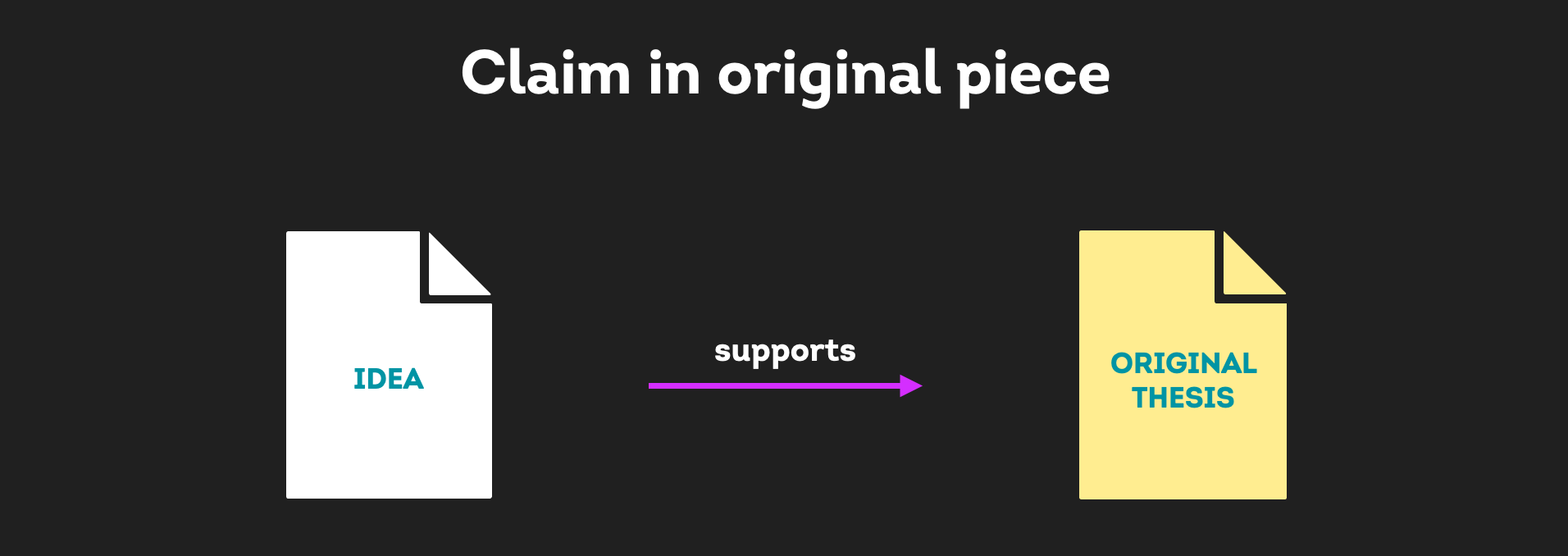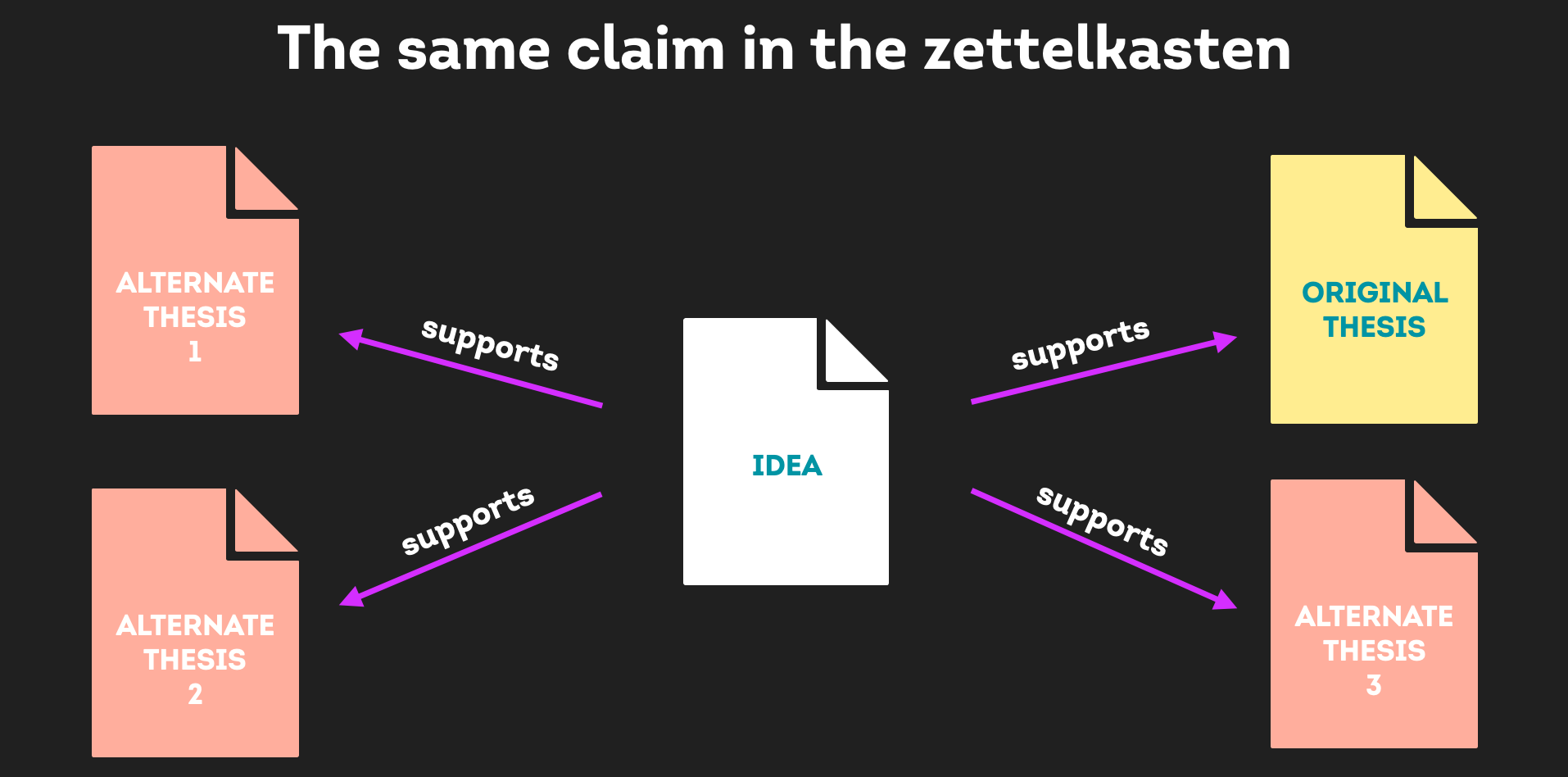Inspired Destruction: How a Zettelkasten Explodes Thoughts (So You Can Have New Ones)
Maintaining a Luhmann-style zettelkasten is, in part, a practice of destabilizing someone else's structured thinking. Complex ideas developed by a writer, once skillfully woven into a fabric of singular theses, are unwound from their original focus in order to yield separate, "atomic" ideas that can be reimagined, reinterpreted, and, ultimately, repurposed for new work. While on the surface this pillaging of someone's writing may seem destructive, even an affront to something sacred, it is actually one of the primary means by which new ideas are developed.
It's All Rhizomes and Intertextuality
Niklas Luhmann's work has for decades been largely ignored by academics in the United States understandably enamored with the experimental writings of French and Russian literary theorists. And yet, Luhmann's zettelkasten, if not his theories, are well fit among the annals of postmodern thought.
Comparisons to Deleuze and Guattari's "rhizome" (a postmodern concept if ever there was one) are fairly common, where Luhmann's nonhierarchical anti-structure is read as a distributed network rather than a top-down categorical system. Less common, though no less deserving, are references to Julia Kristeva's concept of intertextuality—the idea that all written works influence and are influenced by other written works. Or, as Kristeva not-atypically put it: "[E]ach word (text) is an intersection of word (texts) where at least one other word (text) can be read."1 Zettelkasten, anyone?
Speaking about the interaction of the writer and the text, Kristeva states:
"[A]ny text is constructed as a mosaic of quotations; any text is the absorption and transformation of another."2
For Kristeva, all writing (even all thought) is the result of an "absorption" of the writer into a culture of ideas where a person's subjectivity informs their interpretation and representing (or, rather, "re-presenting") of texts. In the case of ideas, thoughts are encountered subjectively, borrowed, taken out of context, and recontextualized in ways that yield alternate ideas that are themselves borrowed and recontextualized.3 Writers who use a Luhmann-style zettelkasten, through the deconstruction of another's work, make explicit the effects of this recontextualization by detonating the structured ideas of previous writers, liberating these ideas from the clutches of their contexts.4 In so doing, new networks of thought are established.
How it Works
Long-form, mainstream, non-fiction works are typically structured to reveal a single argument or thesis (or series of single-ish arguments and theses).5 In these works, the primary claim is constructed out of many smaller claims; supported and organized to reveal a "proven" argument:
Primary Claim: The riot grrrl band, Bratmobile, was a manifestation of third-wave feminism.
Supporting Claim 1: Third-wave feminism critiqued second-wave's reinforcing of hetero-normative beliefs.
Supporting Claim 2: Bratmobile challenged prevailing hetero-normative conventions within the indie-punk music scene.
By using a zettelkasten, each of the above statements can be excised from the original argument, examined on its own, and repurposed for arguments that may have little to do with the original thesis.6 For example, while SUPPORTING CLAIM 1 is used to bolster the idea that Bratmobile was a third-wave feminist punk band, the statement could also be used to discuss differences between second and third-wave feminism in general. In a similar way, SUPPORTING CLAIM 2 can be used in a thread discussing the evolution of punk in general. Even the primary claim itself could be used to discuss not necessarily Bratmobile, but third-wave feminism's embrace of DIY ethics. It could also be used as a foil in a discussion about the prevalence of toxic-masculinity in 90s hardcore music.


Not All That is Broken Is Lost
At first glance, it may appear that by splitting up complex ideas into their "atomic" building blocks one loses the original thesis. However, as the second image shows, this need not be the case.
A note maker can reconstitute the original thesis along with its supporting claims by bringing the deconstructed thesis into the zettelkasten, making explicit connections between the individual ideas. For academics tasked with examining previously written work, this kind of disassembling and reassembling is par for the course. But, for writers who work outside academic institutions, the so-called "rogue academics" not bound by pesky deadlines and dissertation panels, a zettelkasten provides more.
Writers free to pursue any interest that catches their attention can leverage the inherent plasticity of the Luhmann-style zettelkasten, by positioning seemingly disparate ideas in such a way that they can speak with one another—across topic, theme, genre, and context. It's in this way that writers create the conditions for writing and thinking to explode and be exploded.
*If you enjoyed this piece, consider signing up for my weekly newsletter HERE. To learn more about me, click HERE. For my full website, click HERE.
Kristeva, J. (1980). Desire in Language: A Semiotic Approach to Literature and Art. Columbia University Press.↩
Ibid.↩
Professor of language and culture, Per Linell, defines "recontextualization" as "a dynamic transfer-and-transformation of something from one discourse/text-in-context...to another." See: Linell, P. (1998). "Discourse across boundaries: On recontextualizations and the blending of voices in professional discourse." Text and Talk. No. 18.↩
Here, I am, admittedly (and intentionally), speaking in somewhat romantic terms. The entire premise that an idea can exist independent of its context is possible at best. In fact, true and ultimate "atomicity" in note-taking is most definitely a fallacy, especially if we accept that nothing can be truly independent of anything else.↩
The development of complex ideas is actually much more involved. There are many different ways to develop a thesis. However, in its most basic, a thesis is a statement backed up by other statements. In effect, some variation of modus ponens.↩
I purposefully chose "statements" to draw attention to the material thing stated. Ideas can of course be excised from their context, but they never truly lose the stink of it. Assuming otherwise would go against most everything I believe about how language functions.↩